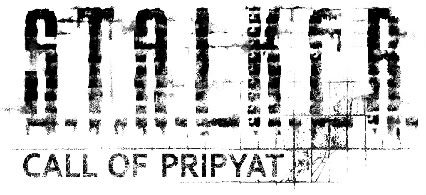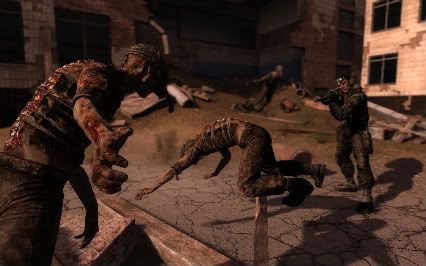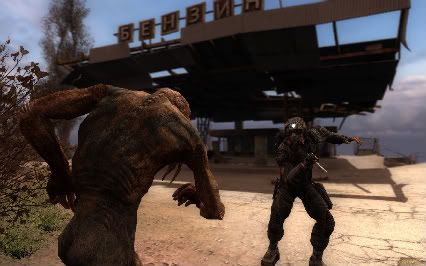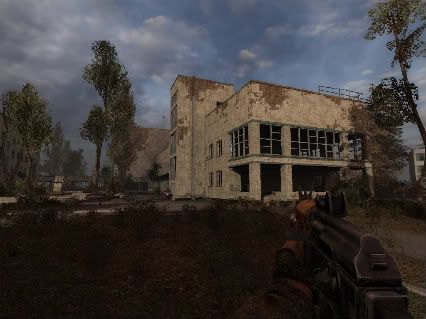
We’re now up to the third game in the Stalker series, with the critically acclaimed Shadow of Chernobyl and the mostly ignored Clear Skies leaving us in some doubt as to what we can expect. Will it be another flawed masterpiece like SoC? Promising so much, only to be hamstrung by crippling bugs. Or perhaps it will be like Clear Skies, taking the wonderful setting and misusing it, to the point where the charm of the world bleeds out through poor design decisions. It’s impossible to make a definitive judgement from our hands-on, but for Stalker fans there’s every reason to be optimistic.
Call of Pripyat places the player not in the boots of a Stalker but of a Ukrainian Secret Service agent, investigating the failure of a military operation tasked with neutralizing the zone. As such you’ll start off better equipped than in the previous titles. As you stumble through the wilderness searching for your initial objectives, other Stalkers will give you tasks. Pretty soon your PDA will have a dozen or so missions and it can be somewhat overwhelming. Any concern though soon fades as you step out into the wilderness and experience the harsh wasteland beautifully crafted for us to explore.

Snorks Ahoy!
Call of Pripyat finds us toward the centre of the zone, an area previously inaccessible, but due to actions of the player in the first game, now facing an influx of Stalkers. This means we won’t be retreading the same maps from either of the previous titles, but instead exploring new territory. The feeling of being an explorer and a pioneer, carving your own path through the nuclear wilderness, is really what Stalker is all about and it’s a point at which Call of Pripyat excels. The maps themselves are centred around hubs where you can trade, get information, upgrade your weapons or visit the doctor. Although the maps aren’t huge in size, they’re packed with things to do and places to explore. In your travels you’ll encounter strange anomalies where the laws of physics are bent and powerful artefacts can be obtained. You may stumble across abandoned factories, subterranean cave systems and laboratories, or old abandoned barges inhabited by half crazed Stalkers.

"I really should've bought that gun..."
The game really rewards exploration too; key items or quest objectives, though usually marked on the map, sometimes can only be found by exploring the little nooks and crannies dotted around the zone. Here’s an example from our experiences; An emission was about to hit the zone, meaning to stay outside would spell certain death, however a quick glance at the PDA map showed there were no buildings nearby for cover, only some sort of hole in the ground. After heading there, it became apparent that this cave was filled with Snorks, deformed mutants who appear to be wearing snorkles. Whilst being chased around and slashed at by our foes, it became apparent the cave was also playing host to an anomaly. In the midst of shooting frenzied mutants, dodging fireballs and searching for artefacts we came across the corpse of a fellow Stalker. Dead Stalkers are not uncommon, but in this particular Stalker’s inventory we find a PDA identifying him as someone we were supposed to be searching for. The truth is, we probably never would have discovered him, if not for the emission occuring at that particular time. But that’s the beauty of the zone; it’s a cleverly crafted world, rich in detail and full of surprises.

"Hmm, a big abandoned building, not at all ominous in any way"
One design decision that definitely stands out this time around is the quests, there are bucketloads of them and fortunately they’re far superior to the ‘go there, kill some guy and get me his weapon’ type encountered in the original. They range from assisting scientists tracking anomalies, to using poison gas to clear out a lair of terrifying Bloodsuckers. The quests actually feel important and as though you’re having an impact on the zone and the rewards are worth the trouble. The only thing that grates about them is that some of the dialogue in the preview copy is truly awful. There’s nothing that takes the feelings of dread and isolation out of a game like being greeted with “Howdyho” by your fellow scavengers. Hopefully that’s just prototype dialogue, because it’s not the only case of offensively Americanised dialogue that feels inappropriate.
In the preview code we here at Critical Gamer were allowed to play with, there are a few other imperfections present, mostly bugs and glitches; but there’s ample time for them to be ironed out before the games Q1 2010 release. If GSC Game World can do that they may have a game on their hands that will not only better the 2007 original, but raise the bar for nuclear wilderness exploration games (that’s actually a real genre now) across the board.
















great review man! great game! can’t wait for it